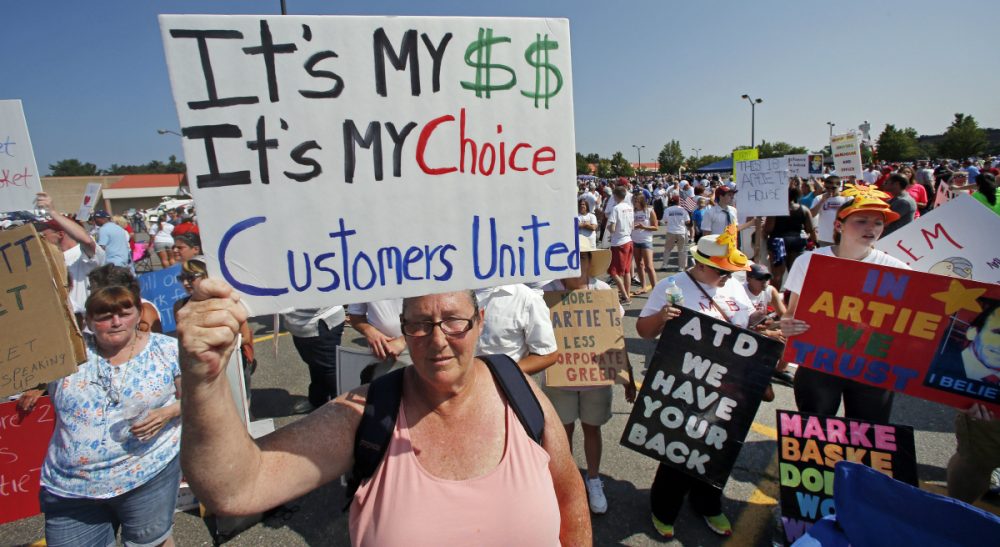Advertisement
Market Basket: The Worst Case Scenario

As I wrote earlier this week, community, state and regional leaders have an enormous stake in resolving the Market Basket fiasco. The welfare, cohesion and future economy of every city and state with a Market Basket store are at risk. That’s why we need a chorus of leaders telling the Demoulas family: “Work this out now in a way that is good for all the parties, including you.” Let’s hope that some sensible negotiators get the message.
History is littered with the detritus of bitter labor disputes that ended badly, and of private equity buyouts that decimated once thriving companies...the fact that the Market Basket dispute’s trajectory seems to be heading there is worrisome, to say the least.
Meanwhile, the papers are filled with rumors and speculation about a range of offers by private equity firms, as well as other supermarket chains. One poster to the Save Market Basket Facebook page doesn’t buy that the offers exist. But in case they do, that same Facebook user has a warning to any CEO or private equity firm that would presume to take over:
To be perfectly clear once again, associates and customers are NOT coming back to Market Basket unless [Arthur T. Demoulas] (ATD) is back in full control with full authority... To any potential buyers other than ATD, you better look at the complete wreck of a business you are buying and you had also better know that the ONLY CEO that can get this fixed and get associates and customers back is ATD... If you buy this shell of a once great business then that is what you will end up with, a shell of a once great business.
The message is unequivocal. So is the evidence that the tone of this conflict is escalating –- and to a potentially dangerous degree. History is littered with the detritus of bitter labor disputes that ended badly, and of private equity buyouts that decimated once thriving companies. To any historian of these events, the fact that the Market Basket dispute’s trajectory seems to be heading there is worrisome, to say the least.
We don’t have to go far back in U.S. labor history to see what the consequences of such a protracted battle look like. Just read "Pain on Their Faces," the testimonials of the community of Jay, Maine, during and after a disastrous 16-month strike at the International Paper Company in the late 1980s. Over the course of that battle, residents found themselves divided into rival camps, supporting either striking workers or those hired to replace them; an inexperienced replacement worker was killed while working on a machine in the mill; a toxic spill in the mill led to an investigation and fines from state and federal environmental agencies; tax abatements promised to the company were rescinded; a large company bond issue was defeated; and local, state and national politicians all weighed in in support of one side or the other. Decades later, some of the scars on families and the community have yet to heal.
What is the right price for an asset that comes with the task of hiring a new workforce in communities where the current workforce is respected, known to all and ready to fight for their company and their jobs?
An even worse scenario would likely result if a private equity firm ends up being the “winning” bidder. As told by Eileen Appelbaum and Rosemary Batt in "Private Equity at Work: When Wall Street Manages Main Street," the goal of most private equity investors is not to build a sustainable, community-oriented business, but to restructure the purchased assets in ways that generate sufficient cash flows to cover their “management fees” until what remains of the business can be sold to someone else. The combination of management fees and the hoped for higher re-sale price provide the investors a handsome return, often at the expense of many good jobs. Once again, the communities are left to pick up the pieces of embittered workers, impoverished and broken families and lost tax revenues.
One would think the strong possibility of this type of protracted and divisive battle would give pause to any outside buyer. What is the right price for an asset that comes with the task of hiring a new workforce in communities where the current workforce is respected, known to all and ready to fight for their company and their jobs? Is the real estate that valuable? Are potential buyers factoring into the purchase price all the various zoning, licensing, traffic and other regulations that local officials could use to make life miserable and raise the costs of operating?
Let’s hope that this negative scenario doesn’t come to pass. Our communities are counting on those directly involved in the negotiations to make sure it doesn’t. Don’t let them down.
More from Cognoscenti:
Related:
